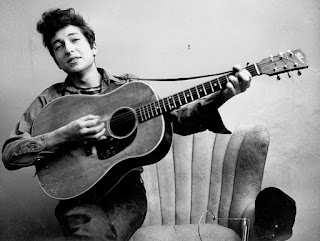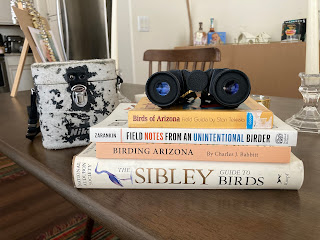Bob Dylan: The Voice of the People
In 2016, Bob Dylan, one of the greatest contributors to folk music of the 20th century, won the Nobel Prize in literature. Many cite Dylan as being the voice of his generation, calling him "The Voice of the People." What does it mean to be "The Voice of the People"? Are artists like Dylan (musicians, painters, etc.) able to claim this title? Do they have a responsibility to use their giftings, the ability to create Beauty, for the benefit of others? I believe that they do. Sara Groves, a Christian music artist, has a song that talks about the importance and "worthwhileness" of Beauty:
Why It Matters
Sit with me and tell me once again
Of the story that's been told us
Of the power that will hold us
Of the beauty, of the beauty
Why it matters
Speak to me until I understand
Why our thinking and creating
Why our efforts of narrating
About the beauty, of the beauty
And why it matters
Like the statue in the park
Of this war torn town
And its protest of the darkness
And the chaos all around
With its beauty, how it matters
How it matters
And Francis Schaeffer, a Christian philosopher who contributed thoughts during the 20th century, wrote of the importance of Art: "A Christian should use these arts to the glory of God, not just as tracts, mind you, but as things of beauty to the praise of God. An artwork can be a doxology in itself." In my life, Bob Dylan has exemplified just this--lyrical art that stirs the soul and draws the attention away from ruminating on self to greater things happening in the world around, where God is orchestrating the course of life.
To be a voice of a people group is to express in one's work the things that seem to be perplexing or attention-consuming for that group, and to express those things through Beauty in such a way that provides clarity or comfort or ease for the people who will hear. These works also tend to transcend time, so that people can appreciate the work, either as a statement of historical significance, or as a picture of the human heart, or both, in subsequent generations.
Jordan Peterson, professor of philosophy at the University of Toronto, is quoted saying that Art "opens your eyes to the domain of the transcendent, a real piece of art is a window into the transcendent...that's what it is...and you need that in your life because you are finite and limited, and bounded by your ignorance and your lack of knowing. And unless you can make a connection to the transcendent then you don't have the strength to prevail."
He continues, "We need to understand the role of art and literature...and stop thinking about it as an option. It's NOT an option. What is it said?: 'Man does not live by bread alone'...That's exactly right. We live by Beauty. We live by literature. We live by art...and LITERALLY, not metaphorically. We cannot live without it."
{In my opinion, this is why, in times of governmental upheaval, oftentimes a target of those wanting to destroy a way of life is the art, the expression, of the people being targeted. Works of art are absconded and stowed away, so that the lay person no longer has access to them. For instance, art stolen by the Nazis during World War II is still missing. See this article from the Washington Post for more information: Why Nazi-seized Art Is Only Now Resurfacing. Taking away the art of a people group disorients them and allows for swifter political and cultural change.}
Bob Dylan examples this "voicing of the thoughts of the people" well, through his art form of song, in a number of ways.
First, Dylan is true to himself in his lyrics. He states thoughts and feelings in such a raw and albeit blunt way. The following lyrics Dylan penned prior to accepting Christ as his Lord and Savior; however, I see these lyrics as similar to imprecatory Psalms, which I will reference below. The thoughts that follow are dark thoughts, dark emotions, and reflect things that we, in our sinful hearts, may consider.
Positively 4th Street
You've got a lot of nerve to say you are my friend,
When I was down you just stood there grinnin'
You've got a lot of nerve to say you've got a helping hand to lend
You just want to be on the side that's winnin'
You say I let you down, ya know it's not like that
If you're so hurt, then why don't you show it?
You say you've lost your faith, but that's not where it's at
You have no faith to lose and you know it
I know the reason, that you talked behind my back
I used to be among that crowd you're in with
Do you take me for such a fool, to think I'd make contact
With the one who tries to hide what he don't know to begin with?
You see me on the street, you always act surprised
You say, "how are you?", "good luck," but ya don't mean it
When you know as well as me you'd rather see me paralyzed
Why don't you come out once and scream it
Imprecatory Psalms
"Let me take my enemies by surprise; let them go down alive to the grave." {Psalm 55:15}
"O God, break the teeth in their mouths." {Psalm 58:6}
"May they be blotted out of the book of life, and not be listed with the righteous." {Psalm 69:28}
"May his children be fatherless and his wife a widow." {Psalm 109:9}
Dylan reveals not only his own humanity in his lyrics, but, deep human emotions that can be experienced by others. Now yes, of course, there is a difference between the way the world hates and the way a believer hates; the reasoning behind the two ways are different. And the struggle looks different for both. However, because we as believers are still in our bodies of flesh, and because our minds are our largest spiritual battle grounds, we know far too well that these types of thoughts can surface, which we must combat with Truth.
Overarchingly, to show the humanity of one--dependence and anger and joy and sorrow--is to show the humanity of all, and yet not in a way that diminishes the unique experience of one person. This is not to say that one ought to assign thoughts and intentions and motives to a person when one is unable to see their heart, as Dylan seems to do in these lyrics; this is only to say that this can be part of the human experience, mired by sin, and depending on the situation, probably is an area where repentance is needed and replacement with truthful thoughts ought to happen.
Secondly, Dylan described the tension of the social and political climate of his day, including the drama of the anti-war youth of the 1960s and the upheaval of the civil rights movement, all the while singing of these happenings with his distinctly rough and twangy voice.
Oxford Town
Oxford town, Oxford town
Everybody's got their heads bowed down
Sun don't shine above the ground
Ain't a'goin' down to Oxford town.
He went down to Oxford town
Guns and clubs followed him down
All because his face was brown
Better get away from Oxford town.
This song is about an African American man named James Meredith, who desired to go to college at the University of Mississippi in Oxford. After applying to Ole Miss twice and being rejected, he made a case of his college application difficulties and took it to the Supreme Court, where it was decided that James had a right to attend college. There was rioting that occurred on the university's campus and throughout the town of Oxford, and President John F. Kennedy had to send US Marshals, as well as US Border Patrol, US Army Military Police, and the Mississippi National Guard to come settle down the situation. Dylan wrote this song as a response to an ad in a magazine asking for a song about the happenings in Oxford.
This is the job of folk music, from whatever background/ethnicity/region of the world it may come: to tell the story of the people, to tell the truth about our human experience, to provide clarity and even comfort in the midst of cultural happenings, the likes of which daunt our understanding. It is of our nature to sing of the things that matter to us. And this is what Bob Dylan does so well.
I Dreamed I Saw St. Augustine
I dreamed I saw St. Augustine
Alive as you or me
Tearing through these quarters
In the utmost misery
With a blanket underneath his arm
And a coat of solid gold
Searching for the very souls
Whom already have been sold
Arise, arise he cried so loud
In a voice without restraint
Come out, ye gifted kings and queens
And hear my sad complaint
No martyr is among ye now
Whom you can call your own
So go on your way accordingly
But know you're not alone
I dreamed I saw St. Augustine
Alive with fiery breath
And I dreamed I was amongst the ones
That put him out to death
O, I awoke in anger
So alone and terrified
I put my fingers against the glass
And bowed my head and cried
Historically speaking, those labeled as "God's people" have martyred the very prophets God has sent them to convict and to speak the Truth with all boldness. This song carries such a deep sadness, with Dylan basically stating he feels that he is amongst those who have caused the martyrdom of a prophet and saint. Dylan puts his fingers "against the glass," through which believers hope to "see dimly" and bows his head and cries, acknowledging his inability to understand his own aid in the carrying out of an atrocious wrong. Dylan's verse reference: "For now we see through a glass, darkly; but then face to face: now I know in part; but then shall I know even as also I am known." {1 Corinthians 13:12 KJV}
Oddly enough, Dylan published this song in 1967, but was not saved until the late 1970s. As a side note, I find the following excerpt from one of his letters to a friend very telling of the transformation that God brought about in Dylan's heart: "You will be strong in the Lord and seeing that looks are deceiving, you will work miracles that way--He has called you to be a saint and your responsibility is to Him and Him alone. Be praying and not looking back no more--press on toward what is ahead--I send love to you and will pray for strength and more strength for ya." The letter ends with Dylan signing out, "Always in the name of Jesus Christ Son of God, Manifest in the flesh."
During an NPR interview, Bob Dylan was asked, "Why does it bother you when people sometimes refer to you as a voice of your generation?" To which he replied: "I think that was just a term that can create problems for somebody, especially if someone just wants to keep it simple and write songs and play them. Having these colossal accolades and titles--they get in the way."
This is the third attribute that makes Dylan's work so transcendent--his allegiance to authentic self-expression that is bound by and to humility. He isn't doing his work for attention or applause; he is doing it because this is who he is, before God, and Dylan is simply being true to that, which in turn resonates with those who listen.
As always, thanks for reading.
XO, Rebecca







Comments
Post a Comment